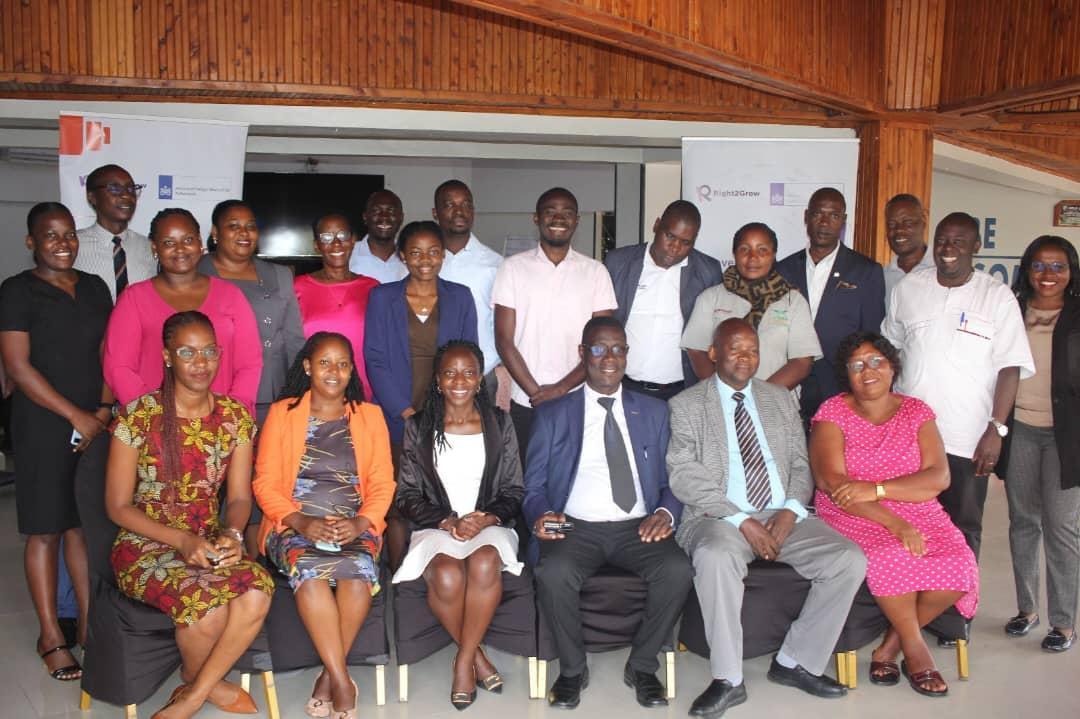Africa-Press – Uganda. Experts and stakeholders in the food and nutrition sector have urged for increased investment, stronger coordination, and deeper community involvement to sustain momentum and meet national targets.
The calls were made during a roundtable convened by the Food Rights Alliance (FRA) Uganda under the Right2Grow programme, where stakeholders gathered at Fairway Hotel in Kampala to reflect on the country’s Zero Stunting Campaign, launched in 2023 in partnership with the Ministry of Health.
The campaign aims to reduce stunting among children under five from 29% to 19% by the end of 2025.
The event, themed “Feed Me Right, Secure My Future,” marked the release of a campaign learning brief and served as a platform to share successes, challenges, and lessons from the field.
Uganda has so far reduced stunting rates among children under five from 29% to 21%, a significant step forward, but stakeholders warned that the gains remain fragile.
Speaking during the workshop, Alice Yayeri Nakku, the Country Lead for Right2Grow Uganda and part of the Hunger Project Uganda, noted that while the drop from 29% to 26% and now to 21% is commendable, much remains to be done.
“We really want to commend the different stakeholders, especially the government of Uganda, the care ministries that work towards reducing stunting, but this number is really still high,” Nakku said.
“There are still gaps in coordination among the different stakeholders at both the national as well as the subnational levels.”
She noted that insufficient resource allocation has undermined implementation, urging that nutrition initiatives be fully funded in Uganda’s upcoming National Development Plan IV (NDP IV).
Nakku also called for increased community engagement, noting that locally-led solutions are vital to sustained impact.
“Community participation, especially in regards to planning, allocation resources, and identification of priorities is crucial,” she added.
“From this meeting, we realized that some of the challenges that could have led to the high levels of stunting [include] that we are not working together as stakeholders.”
*Innovation and New Approaches*
Ritah Kabanyoro, the Country Director of Action Against Hunger (ACF) in Uganda, spoke to the importance of innovation, pointing to a new proposal her organisation is developing.
“We are working on a proposal right now about what we call creating food from thin air and it’s quite phenomenal. So we are here to discuss some of the innovations and lessons from what we have done over the last one and half years, and what should change moving forward,” she said.
Kabanyoro encouraged all participants and stakeholders to learn from the campaign and continue building on its momentum in the fight against malnutrition.
Speaking to journalists, the Ministry of Health’s Assistant Commissioner for Nutrition, Samalie Namukose, provided insight into government-led efforts to tackle stunting using a life-cycle approach, starting with maternal nutrition and continuing through early childhood care.
“If a mother is malnourished, then this mother is likely also to produce a malnourished child,” Namukose said. “We are promoting a healthy diet for the mother, micronutrient supplementation, and breastfeeding.”
Namukose highlighted new initiatives like the introduction of multiple micronutrient supplements for pregnant women and the development of breast milk banks to support infants who are unable to breastfeed naturally.
Yet, she also pointed out persistent challenges such as poor caregiving, food insecurity, and limited access to health services, that continue to fuel stunting.
“There are some mothers who just abandon their babies… A household may not have food for a very long time… If these households are staying very far from the health facilities, they are sick, they don’t go to the health facilities,” she noted.
“When one is sick, it is not treated, then they are likely to worsen. Malnutrition sets in.”
With the 2025 target looming, all speakers issued a unified call to action, urging stakeholders from government agencies and civil society to the private sector to align their efforts and scale up interventions.
Nakku urged that stakeholders “join the different Scaling Up Nutrition (SUN) platforms such as the private sector, business networks, the CSO networks..so that we can contribute towards the reduction of stunting in the country.”
As Uganda prepares its next development strategy under NDP IV, experts at the roundtable stressed the urgency of translating lessons learned into policy and ensuring that nutrition becomes a cross-sectoral priority, not just a health issue, but a national development imperative.
For More News And Analysis About Uganda Follow Africa-Press






